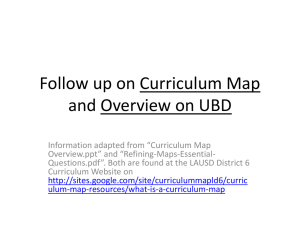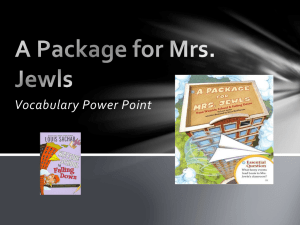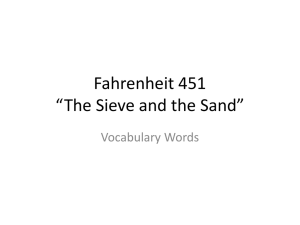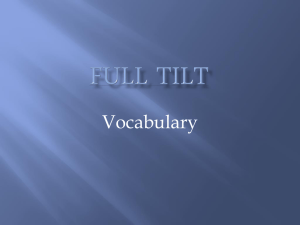Of Mice and Men Notes
advertisement
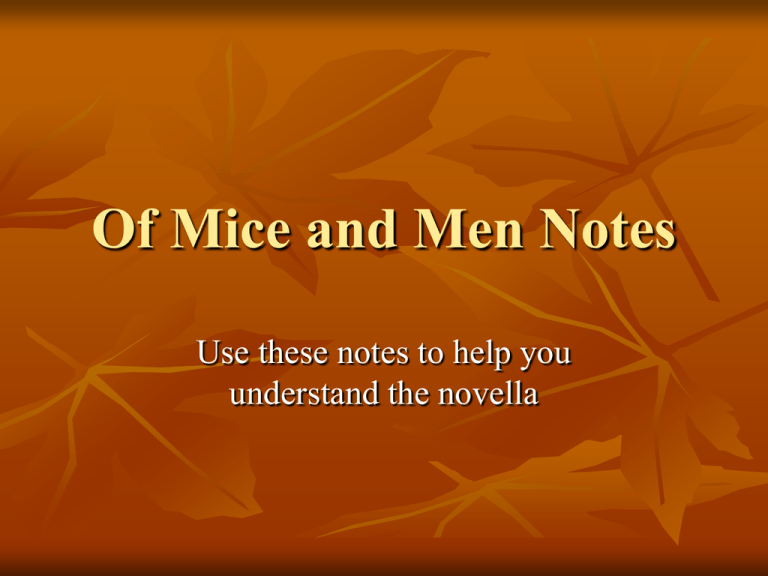
Of Mice and Men Notes Use these notes to help you understand the novella Vocabulary Chapter 1 1. 2. 3. 4. 5. 6. Bindle (noun) – a bundle of bedding carried by a traveler Jack (noun) – slang term for money Morosely (adverb) – with sadness (She morosely took the test because she knew she hadn’t studied very hard.) Pantomime (verb) – to copy (The toddler pantomimed his mother’s actions.) Drone (verb) – to go on and on in a monotone (The math teacher droned on about fractions.) Contemplate (verb) – to think about deeply (He contemplated his next move very carefully.) Allusions and Historical References Chapter 1 – Soledad, CA Allusions and Historical References Chapter 1 – Salinas River Allusions and Historical References Chapter 1 – Weed, CA Allusions and Historical References “watchin the blackboard”/ work cards Literary Terms Chapter 1 Imply – To guess what the meaning is based on information gathered. (I can imply that you had math homework last night because I see many of you trying to finish it right now.) Allusion – a reference in literature to something that the author assumes is within the readers’ frame of reference. (Weed, CA) Exposition – The very beginning of the novel (How everything starts out) Setting – Time, place and historical context of the story (What’s the setting of this novel?) Point of view – The perspective from which the story is told (What are the different points of view in literature? What is this story told in? Check the first page!) Vocabulary Chapter 2 1. 2. 3. Swamper (noun) – handyman; someone who performs odd jobs (What job might this person be responsible for on a farm?) Tick (noun) – A mattress cover; like a thick sheet Stable buck (noun) – A stable is a place for horses, A buck is used in this instance as a derogatory term for a black man. Therefore, a stable buck is a black man that works in a stable with the horses. Vocabulary Chapter 2 4. Skinner (noun) – a person responsible for driving the mules (in this case a job that requires a higher level of skill than your average farm worker) 5. Cesspool (noun) – An stagnate pool of water that usually has algae growing in it among other things 6. Ominously (adverb) – Ominous means foreboding or dangerous so doing something ominously would be doing it in such a way that it causes suspicion or fear 7. Pugnacious (adjective) – Filled with anger; argumentative 8. Mollified (verb) – to feel appeased; to have feelings of anger grow less intense Literary Terms: Chapter 2 Dialect – Language used by a specific group of people (Southern dialect vs Californian dialect) Novella – A short novel Irony – When the opposite of what you expect to happen, happens Direct Characterization – When the author gives you a specific description. (What is a piece of direct characterization for George?) Indirect Characterization – When an author sets up a situation where you learn about the character based on his or her actions. (What is a piece of indirect characterization for Lennie?) Impressions/Predictions Vocabulary Chapter 3 1. 2. 3. 4. Derision (noun) – ridicule or mockery; making fun of someone. (The derision in the classroom caused much commotion.) Receptive (adjective) – willingness to receive (The students were receptive of the information that the teacher provided.) Reprehensible (adjective) – deserving blame (If someone is reprehensible, he or she has done something bad or wrong.) Reverence (noun) – a feeling of deep respect. (I show reverence when meeting an award-winning author. I have respect for her work.) Chapter 3 Allusions and Historical References Luger – German semiautomatic pistol Chapter 3 Literary Terms Theme – The central lesson that the author is trying to convey. (Topic + Opinion = Theme) Imagery – Description that creates a mental picture for the reader. (Uses all 5 senses) Onomatopoeia – A word that sounds like its meaning. (pop, sizzle, cuckoo) Foreshadow – When an author gives hints about what is coming up in the novel. Chapter 3 Literary Terms Conflict – The problems that arise during the course of the novel. Man vs Man Man vs Nature Man vs Society Man vs Self Chapter 4 Vocabulary 1. 2. 3. Aloof (adj): reserved, indifferent (The aloof student sat in the back of the classroom and hardly participated. ) Fawning (verb): to seek notice or favor by a servile demeanor, obsequious (The fawning mother continued to brag about her child’s award.) Apprehension (noun): nervous about an outcome (The students faced much apprehension while waiting for their AP Euro test to be returned. ) Chapter 4 Vocabulary Continued 4. Indignation (noun): strong displeasure at something considered unjust or offensive (She had much indignation when she was passed over for a promotion because she was pregnant.) 5. Crestfallen (adj): dejected, sad (The crestfallen child cried after she lost the soccer game.) Chapter 4 Literary Terms Verbal irony: When a person says or writes one thing but means another; the words are meant to convey a meaning opposite of a literal meaning Saying, “Terrible weather we're having!" on a beautiful, sunny spring day. Symbolism: Symbols used to represent something with a larger meaning (the dream farm for Lennie, George and Candy represents what on a greater scale? Chapter 5 and 6 Vocabulary 1. 2. 3. 4. Woe (noun): Deep suffering (She was filled with woe when she heard that her dear aunt had passed.) Writhed (verb): To twist in pain (The caterpillar writhed when the little boy pierced him with the stick.) Belligerently (adverb): ready to fight (The student belligerently yelled at the teacher and then ran out the door.) Monotonous (noun): same thing again and again (Math is sometimes monotonous.) Chapter 5/6 Literary Terms Protagonist: The main character who faces conflicts throughout the novel Who is the protagonist in the novel? Who encounters the most problems? Personification: Giving human-like qualities to non-human things Example: The sun is smiling down his happy rays of golden delight! Chapter 4 Paragraph Topic sentence: In Of Mice and Men Steinbeck explores the idea that life is not complete with out having a person to share it with. He focuses on this theme through several characters who are faced with loneliness. For example, ________ says, “…” This demonstrates…Another character, _________ shows (his/her) longing for a companion when ….





